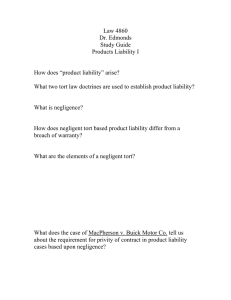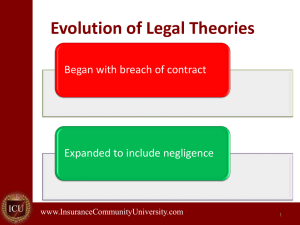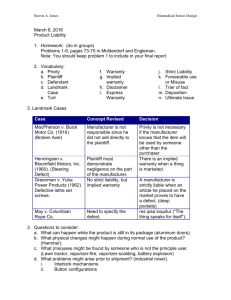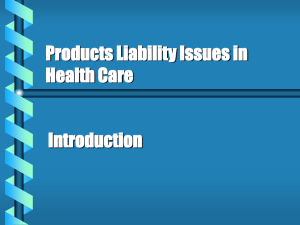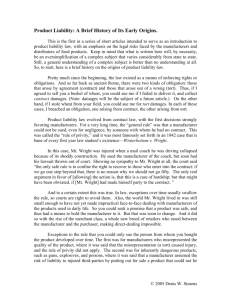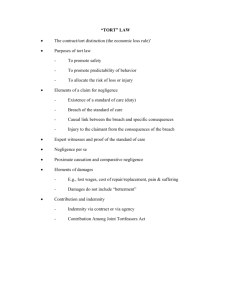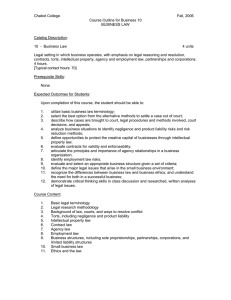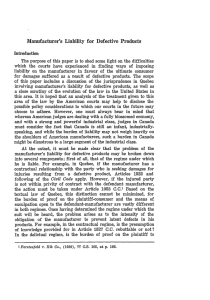Products Liability
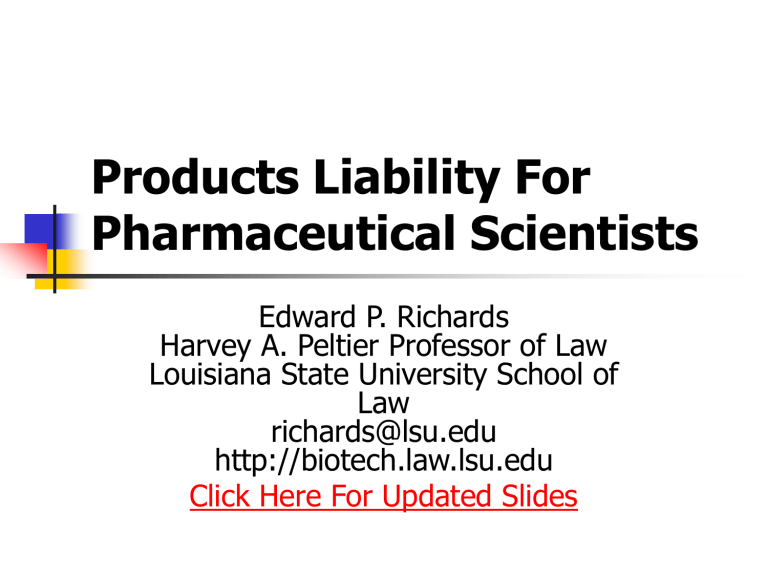
Products Liability For
Pharmaceutical Scientists
Edward P. Richards
Harvey A. Peltier Professor of Law
Louisiana State University School of
Law richards@lsu.edu
http://biotech.law.lsu.edu
Click Here For Updated Slides
History of Drug Liability
FDA History is the History of Drug
Injuries
FDA Regulation Tries to Prevent Future
Injuries
Tort Litigation Compensates for Past
Injuries
2
Multiple Sovereigns
Tort Law for Drugs is State Law
Basic Theories are the Same
Significant Variation on Details
Federal Courts Apply State Law
Individual Judges Have Great Discretion
Many Case Depend on Whether the Judge
Admits the Plaintiff's Evidence
Forum Shopping
3
Negligence
Traditional Cases Were Usually Based in
Negligence
Had to Show Legal Relationship –
Privity
No Relationship Between Patient and Drug
Company
Ended with Pharmacist
Made Sense when Pharmacists
Compounded all the Drugs
4
Fall of Privity
Courts Found Privity Out of Date with the Industrial Revolution
Thomas v. Winchester (1852)
Supplier Provided Belladonna rather than
Dandelion
Privity would have Blocked the Claim
Court Limited Privity for Dangerous
Activities
5
Early Strict Liability
Many States Imposed Strict Liability for
Ultrahazardous Activities
Blasting
Impounding Water
Plaintiff did not need to Show Negligence, only Injury Due to the Activity
Very Limited Application – not generally extended to Drugs
6
Limits of Negligence
Must Show Breach of Standard of Care
What a Reasonable Manufacturer Would
Do?
Only Evidence is Other Manufacturers
Must Show What Happened to the
Specific Batch
7
Warranty Theories
Predate Strict Liability
Related to UCC Warranties
Cannot Disclaim for Personal Injuries
Based on Promises
Special Problem for Promoting Off-Label
Uses
8
Express Warranty
Manufacturer Is Held to Specific Promises
Shatterproof Windshield Case
Claimed It Was Just “Puffing”
Court Said It Was a Clear Promise
Did Not Matter If It Was Impossible
Can Be Written or Verbal
Can Physicians Give Binding Warranties About
Products?
9
Implied Warranties
Implied From the Context of the Sale
A Product Is Safe for What It Is Sold for
FDA Approved Drugs Have Only the Stated
Risks
Implied Warranty of Fitness for a Specific
Purpose
Manufacturer or Seller Says the Product Is
Good for Something Other Than Its Usual
Purpose
Use of Drugs For Unapproved Purposes
10
Jeep Case
Jeep Sold for off the Road Use
Rolled and Killed and Injured Passengers
Made Like a Sardine Can
Manufacturer Claimed Improper Use
How Do You Prove?
Advertising
Representations by Sales Persons
11
Shift to Strict Liability
Hard to Prove Negligence for Products
Generic Goods - No Specific Information
Defendant’s Have Lots of Resources
Defects Affect Lots of People
Strict Liability Encourages Safety
Cannot Escape Liability by Just Doing What
Others Do
Safer Products = Lower Costs
12
Restatement of Torts 402a
(1) One who sells any product in a defective condition unreasonably dangerous to the user or consumer or to his property is subject to liability for physical harm thereby caused to the ultimate user or consumer, or to his property, if
(a) the seller is engaged in the business of selling such a product, and
(b) it is expected to and does reach the user or consumer without substantial change in the condition in which it is sold .
13
Limited Defenses under 402a
(2) The rule stated in Subsection (1) applies although
(a) the seller has exercised all possible care in the preparation and
sale of his product, and
(b) the user or consumer has not bought the product from or entered into any contractual relation with the seller.
14
Unavoidably Unsafe Products
Comment K
Key Defense for Drugs
Recognizes that Many Drugs are Very
Dangerous
Pasteur Rabies Vaccine Example
Looks at the Label Information
Does it Explain How to Use the Drug?
Does it Warn about Dangers?
Did it Get to the Decision-maker?
15
Who Else is Liable?
Usually Both Sellers and Manufacturers
Are Liable
Health Care is Different
Product v. Service Distinction
The Patient is Not the Buyer
The Doctor is Not the Seller
The Hospital is Not (Considered) a Supplier
Limited Liability for Pharmacies
16
Product Must Be Defective
Manufacturing Defect
Easy to Prove
Limited Number Affected
Example: Improper Sterilization
Design Defect
Effects Every Unit
Includes Warnings
Thalidomide, DES, Mer-29
17
Plaintiff Must Show Causation
Why Does the Defect Make the Product
Unreasonable Dangerous?
Did the Defect Cause the Patient's
Injury?
Often Circular in Drugs
Bendectin Causes Birth Defects so
Bendectin is Defective so Bendectin Caused
My Baby's Birth Defect
Expert Testimony is Critical
18
Is it Unreasonably Dangerous?
Courts Use Two Tests
Consumer Expectations
Usually OTC Drugs
Big Issue with Direct Promotion
Risk/Benefit Analysis
Rx Drugs
Little Deference to FDA Determinations
Danger to One Group Can Deny to All
19
What if the Doc Uses the Drug
Improperly?
Learned Intermediary Defense
Was the Doc Properly Warned?
Did She Rely on Manufacturer's
Representations?
Does the Manufacturer/Seller
Encourage Misuse?
Over-Promotion - Chloramphenicol
Selling For Improper Use - Oximeters
20
FDA Labels And Products
Liability
Is There A Regulatory Compliance
Defense?
What If The FDA Will Not Let You
Include A Warning?
What Is The Evidentiary Value Of An
FDA Label?
21
Brave New World
Internet Sales
No Doc
No Information
Manufacturers Know About It
Non-Physician Prescribers
States Are Broadening Who Can Prescribe
Courts Have Not Found Nurses, Physicians
Assistants, and other Non-Physicians to be
Learned Intermedi22aries
22

